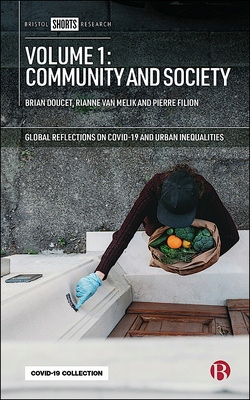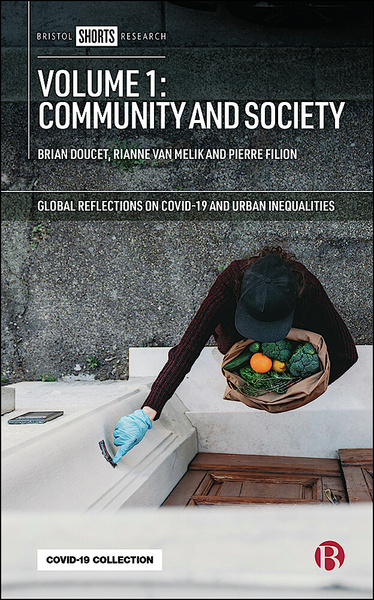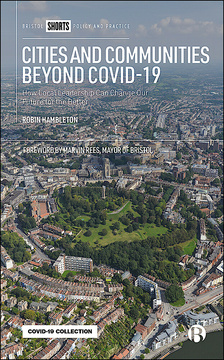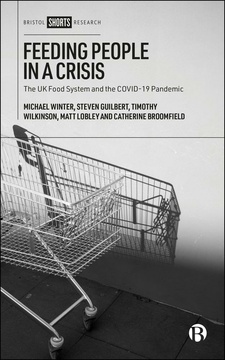Volume 1: Community and Society
Edited by Brian Doucet, Rianne van Melik and Pierre Filion
Published
Jul 22, 2021Page count
284 pagesBrowse the series
Global Reflections on COVID-19 and Urban InequalitiesISBN
978-1529218879Dimensions
203 x 127 mmImprint
Bristol University PressPublished
Jul 22, 2021Page count
284 pagesBrowse the series
Global Reflections on COVID-19 and Urban InequalitiesISBN
978-1529218886Imprint
Bristol University PressPublished
Jul 22, 2021Page count
284 pagesBrowse the series
Global Reflections on COVID-19 and Urban InequalitiesISBN
978-1529218886Imprint
Bristol University PressOur experiences of the city are dependent on our gender, race, class, age, ability, and sexual orientation. It was already clear before the pandemic that cities around the world were divided and becoming increasingly unequal. The pandemic has torn back the curtain on many of these pre-existing inequalities.
Contributions to this volume engage directly with different urban communities around the world. They give voice to those who experience poverty, discrimination and marginalisation in order to put them in the front and center of planning, policy, and political debates that make and shape cities.
Offering crucial insights for reforming cities to be more resilient to future crises, this is an invaluable resource for scholars and policy makers alike.
“Empirically rich and theoretically nuanced, this volume underscores the various ways in which COVID 19 is deepening and extending inequalities in cities around the world.” Kevin Ward, University of Manchester
Brian Doucet is Associate Professor and Canada Research Chair in Urban Change and Social Inclusion at the School of Planning, University of Waterloo, Canada.
Rianne van Melik is Assistant Professor in Urban Geography at the Institute for Management Research (IMR), Radboud University, Nijmegen, the Netherlands.
Pierre Filion is Professor at the School of Planning, University of Waterloo, Canada.
Introduction ~ Brian Doucet, Rianne Van Melik and Pierre Filion
Part 1: Working Practices
Street Vendor Struggles: Maintaining a Livelihood Through the COVID-19 Lockdown in Hanoi, Vietnam ~ Sarah Turner and Nguyen N. Binh
The Man and the Scooter: How the Low-Income Worker Helps Save a Locked-Down City ~ Abdellatif Qamhaieh
The Hidden Inequities and Divisions Among Workers in the US: The Domestic Workers Workforce As Non-Essential Workers ~ Carolina Sternberg
Reflections of Living ‘Hand-to-Mouth’ Among ‘Hustlers’ During COVID-19: Insights on the Realities of Poverty in Jamaica ~ Sheere Brooks
Looking at Urban Inequalities Regarding Different Jobs in the Age of COVID-19: Who Stayed at Home, Who Did Not? ~ Ferhan Gezici and Cansu Ilhan
Part 2: Life During Lockdown
Ageist Transport Infrastructures: Rethinking Public Transport Amidst COVID-19 Lockdowns in India ~
Prajwal Nagesh, Ajay Bailey, Sobin George and Lekha Subaiya
The Pandemic and Food Insecurity in Small Cities of the Global South: A Case Study of Noapara in Bangladesh ~ M. Feisal Rahman and Hanna A. Ruszczyk
How Governments’ Response to the Pandemic Exacerbate Gender Inequalities in Belarus and Ukraine: Comparative Analysis of Minsk and Kyiv Cases ~ Olga Matveieva and Vasil Navumau
Infrastructure Inequality and Privileged Capacity To Transform Everyday Life in COVID-19 South Africa ~ Charlotte Lemanski and Jiska De Groot
Under Quarantine in a City Project: Stories of Food, Family, Fear and Community ~ Jeremy Auerbach, Jordin Clark and Solange Muñoz
The Impacts of Socio-Spatial Inequity: COVID-19 in São Paulo ~ Roberto Rocco, Beatriz Kara José, Higor Carvalho and Luciana Royer
Part 3: Migration, Migrants and Refugees
Liminality, Gender and Ethnic Dynamics in Urban Space: COVID-19 and Its Consequences for Young Female Migrants (YFM) in Dhaka ~ Ellen Bal, Lorraine Nencel, Hosna J. Shewly and Sanjeeb Drong
Spatial Inequality and Colonial Palimpsest in Kuala Lumpur ~ Nurul Azreen Azlan
The COVID-19 Pandemic and the Travails of Rohingya Refugees in the Largest Bangladeshi Refugee Camp ~ Diotima Chattoraj, AKM Ahsan Ullah and Mallik Akram Hossain
Singapore’s Pandemic Governance and Deepening Marginalisation of Migrant Workmen ~ Sallie Yea
Part 4: Age, Race, Gender and Ability
Experiential Equity: An Environmental Neuroscientific Lens for Disparities in Urban Stress ~ Robin Mazumder
What Is the Relationship Between COVID-19 and the Movement To “Defund the Police”? ~ Richardson Dilworth and Timothy PR Weaver
Following the Voices of Older Adults During the COVID-19 Crisis: Perspectives From the Netherlands ~ Jolanda Lindenberg, Paul Van De Vijver, Lieke De Kock, David Van Bodegom and Niels Bartels
The Role of Social Infrastructures for Trans* People During the COVID-19 Pandemic ~ Magdalena Rodekirchen and Sawyer Phinney
COVID-19 and Blind Spaces: Responding to Digital (In)accessibility and Social Isolation During Lockdown for Blind, Deafblind, Low Vision, and Vision Impaired Persons in Aotearoa New Zealand ~ Rebekah Graham, Bridgette Masters-Awatere, Chrissie Cowan,
Conclusion ~ Brian Doucet, Rianne Van Melik and Pierre Filion











